Paul’s view of the Wrath of God?
Question.
Is it accurate to say that events such as the AIDS epidemic are God’s Wrath on the
world in light of Paul’s understanding of the wrath of God?
Table of Contents
Synopsis.
The Background to Paul’s Thought; The Old Testament.
The Pre-exilic Period.
The Post Exilic Period.
New Testament Period.
Paul’s View in his Writings.
Statement of Paul’s View.
Application.
Conclusion.
BIBLIOGRAPHY.
Synopsis.
In seeking to understand the concept of the wrath of God and
place in it’s proper context there lies a frustration
which bemoans most lay people. That is, exactly what is, “the wrath of God” and
when is it experienced? Likewise, when we look at issues like that raised in
the title for this essay, can we with confidence assure our people that such
things are either, not sent by God or that they are sent as a warning, to those
who might stray from the narrow path. This is no more clearly demonstrated than
by the individual who claims, the reason the Apollo 13 mission was beset with
trouble was that they were subject to God’s wrath, for declaring supposedly
“the dawning of the age of Aquarius”
.
Discussion
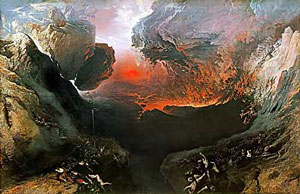 When we look at the history of God’s intervention in his
creation, we have recorded distinct accounts of his coming into the world and
expressing his wrath. Of this, an example would be the using of the Babylonian
kingdom to purify the nation of Israel
The book of Isaiah holds within its covers the story of how God who having been
filled to the limit of his patience, (see also Amos) chose to use the forces of
neighbouring kingdoms to express his wrath.
When we look at the history of God’s intervention in his
creation, we have recorded distinct accounts of his coming into the world and
expressing his wrath. Of this, an example would be the using of the Babylonian
kingdom to purify the nation of Israel
The book of Isaiah holds within its covers the story of how God who having been
filled to the limit of his patience, (see also Amos) chose to use the forces of
neighbouring kingdoms to express his wrath.
In trying to understand if God’s wrath still supernaturally
intervenes in creation today, Paul’s writings have been chosen to seek to find
a window of knowledge when it comes to such sensitive issues as, “is AIDS an
expression of God wrath on the Gay community”.
The Background to Paul’s Thought; The Old Testament.
In trying to understand Paul’s view of the wrath of God, it
is necessary to look into the Old Testament for it is there that, we will find
the background to the understanding of this Pharisee of Pharisees. Paul’s
heritage as a Hebrew and a Pharisee means that he would have been well
instructed in the history of God’s wrath and its expression throughout Israel's history.
There would be many who would repudiate the notion of God’s
wrath as unworthy of God’s character, as that character is revealed in Christ.
Yet, it is hard to explain away something that is so prominently been written
about throughout the Old Testament
.
The Pre-exilic Period.
 From the very first pages of Genesis, the issue of God’s
wrath is raised. Tasker writes that it is not necessarily in the use of the
exact expression (the wrath of God) but by the reference to, the divine
judgements and punishments imposed upon humankind, that his absolute
sovereignty and justice could be illustrated
.
The course of events subsequent to the fall of Adam and Eve in the Garden of
Eden is a manifestation in word and deed of the wrath of God
.
From the very first pages of Genesis, the issue of God’s
wrath is raised. Tasker writes that it is not necessarily in the use of the
exact expression (the wrath of God) but by the reference to, the divine
judgements and punishments imposed upon humankind, that his absolute
sovereignty and justice could be illustrated
.
The course of events subsequent to the fall of Adam and Eve in the Garden of
Eden is a manifestation in word and deed of the wrath of God
.
An event in biblical history that is without parallel is the
wrath of God expressed via the flood of Genesis
7. Perhaps the only event that will parallel this is the
long awaited “day of wrath” that is expected in the last days.
Another event that is seen as an expression of God’s wrath
although the exact expression is not used is the confusion of speech at the tower of Babel. It is here that we find the
starting point in understanding what the wrath of God is all about. Tasker
rightly points out that in expressing his wrath God humbles the proud and
highlights how humankind by sinning is driven deeper into a state of utter misery
and distress
.
This is a truth that Paul will bring out in greater depth in Romans chapter
one.
In comparison to Tasker’s view of the wrath of God as being
manifested in word and deed as early as Genesis, A.T Hanson writes,”probably
the oldest part of the Bible in which we meet with the wrath of God is the
older narratives of 1 and 2 Samuel
”.
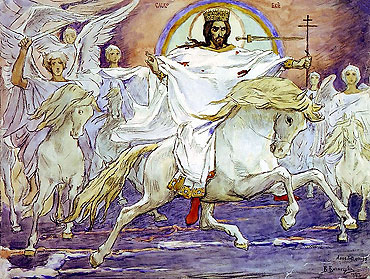 Wrath here seems little to do with either justice or morality,
for the death of Uzzah in second Samuel 6 seems to be pointless
.
Yet out of these events, two important aspects of God’s wrath are drawn out.
Firstly, that it was by some form of direct visitation that Uzzah met his death
and secondly that the divine wrath could be appeased. By taking the ark to the
house of Obed-edom it became clear that God’s anger had been appeased as no
further disasters befell those who cared for the ark, in fact David took it as
a sign of God’s approval for the actions taken
.
Wrath here seems little to do with either justice or morality,
for the death of Uzzah in second Samuel 6 seems to be pointless
.
Yet out of these events, two important aspects of God’s wrath are drawn out.
Firstly, that it was by some form of direct visitation that Uzzah met his death
and secondly that the divine wrath could be appeased. By taking the ark to the
house of Obed-edom it became clear that God’s anger had been appeased as no
further disasters befell those who cared for the ark, in fact David took it as
a sign of God’s approval for the actions taken
.
As one traces the theme of God’s wrath through the Old
Testament there are several incidents that must be dealt with in order to
properly understand it.
Exodus 15
holds the song of Moses and in verse seven God’s wrath is equated to fire as
the Egyptians are said to have been consumed by the fire from God’s nostrils.
Walter C. Kaiser translates it as “you unleashed your burning anger”
and evaluates the strong east wind with the theological term “the blast of your
nostrils”
.
As is so often found in the Old Testament the wrath of God is personified here
and is also expressed with the use of metaphor.
 The New King James translates God’s wrath as becoming “hot”
and being expressed through the use of the sword against those who would
oppress the weak, poor or strangers (Exodus 22:24). Yet, Kaiser simply
translated this as “aroused”
.
Gesenius’ Hebrew Lexicon holds to the stronger word found in the New King
James, King James (wax hot) and the NRSV (burn)
.
The issue here is not Kaiser’s translation but the way in which the wrath of
God is delivered. It is to be delivered with the sword. Are we to suppose that
God will come down from his dwelling place and smit the accused with a physical
sword or will he in fact use earthly forces as the means of his expressing a
wrath that burns like fire. Kaiser writes that God is
placing himself as the protector of the weak and oppressed since these people
have few or no natural protectors in their society
.
The New King James translates God’s wrath as becoming “hot”
and being expressed through the use of the sword against those who would
oppress the weak, poor or strangers (Exodus 22:24). Yet, Kaiser simply
translated this as “aroused”
.
Gesenius’ Hebrew Lexicon holds to the stronger word found in the New King
James, King James (wax hot) and the NRSV (burn)
.
The issue here is not Kaiser’s translation but the way in which the wrath of
God is delivered. It is to be delivered with the sword. Are we to suppose that
God will come down from his dwelling place and smit the accused with a physical
sword or will he in fact use earthly forces as the means of his expressing a
wrath that burns like fire. Kaiser writes that God is
placing himself as the protector of the weak and oppressed since these people
have few or no natural protectors in their society
.
Again in Exodus 32:10
God says his wrath will burn hot against the stiff necked people and promises
to consume them. Here God follows a threat with a promise to make them a great
nation. Two sides of God’s character are exposed here, his unmerciful and his
merciful. The latter allowing himself to be bound to a people who are prepared
to do his will his way
.
The real measure of God’s divine power and wrath is not measured in his ability
to destroy that which he created but to change the human personality
.
This expression is to be a consistent theme that is in juxtaposition with God’s
wrath throughout the Old Testament.
Doing God’s will his way is again the theme of the events of
Leviticus 10:2 where we read
that fire went out from the Lord and consumed the sons of Aaron. R. Laird
Harris compares the wrong of Aaron’s son’s with that of Ananias and Sapphira in
Acts chapter 5
.
Gordon J. Wenham writes, “tragedy and triumph go hand
in hand in the Bible and in life”
.
How do we explain the fate of Nadab and Abihu(Leviticus
10:1-14)? We can only reflect on the absolute holiness and sovereignty of God
and his need to be the one consistent being. The son’s of Aaron did not follow
the prescribed will of God and suffered the penalty of a righteous God, whose
wrath is as much a part of his character as his love and mercy. Yet God himself
reassures Aaron of the place of the priesthood in teaching the people the
manner of holiness and the consequences of a profane lifestyle
.
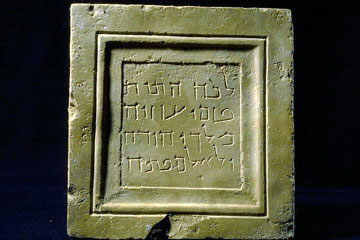 Wenham, rightly points out that this incident lifts the lid
off the attitude found in the church today that is ignorant of a divine wrath
and judgement and that is supposed to have passed away with the Old Testament
.
The only point at issue is the manner of the expression of God’s wrath post Old
Testament, something that will be explored when looking at Paul’ writings.
Wenham, rightly points out that this incident lifts the lid
off the attitude found in the church today that is ignorant of a divine wrath
and judgement and that is supposed to have passed away with the Old Testament
.
The only point at issue is the manner of the expression of God’s wrath post Old
Testament, something that will be explored when looking at Paul’ writings.
It is Moses’ word from God that puts this incident in its
proper context with these words, “Through those who are near me I will show
myself holy, and before all the people I will be glorified” (NRSV).
God’s wrath then is aimed at pointing humankind towards holiness. Even those
events that Hanson
claims to be without reason have a link to our attitudes towards God.
This is clearly, what God is talking about in Leviticus 23:30 when he declares that he will
destroy those who fail to observe the Day of Atonement. White writes, “The
wrath of God is never unleashed for no purpose or for some mysterious outcome;
the acts of God in justice are always clearly visible”
.
White would say that the means of God’s wrath is always some created agency, be
that his angelic hosts as in 2nd Samuel 24:17 or one of the gentile nations.
Leviticus 26
contains a list of “if you will, I will” but "if you don’t, then I will”.
Verse 28 of Leviticus 26
has God threatening to walk contrary to the people in fury. This represents a
reversal of all that God has promised Abraham and seems to put and end to the
covenant. It is important to remember that this is not the end of the covenant
but an integral part of the Suzerain style of covenant that God made with
Abraham. This type of covenant consisted of a section, which spelt out the
curses, and blessings that would be invoked upon the vassal for either breaking
or keeping the covenant
.
 As to the agency of God’s wrath, it has been seen that God
has promised to use his angelic host, direct visitation and other nations to
deliver his wrath upon Israel.
Numbers 11:33 has the people
set upon by a plague because of their continual complaining, a threat which is
directed at the people of Israel
in verses 19 and 20. Timothy R. Ashley suggests there is some conjecture,
whether the plague was due to the gluttonous actions of some who collected more
than 10 Homers of quail. As a result, they suffered from food poisoning before
the supply had run out. Some translations indicate that the plague broke out at
the first taste of the meat (NKJV, RV,
and NASB)
.
The focus here is on the translation of the word “
K
àrat
” of which Ashley
claims is uniquely translated here by some as “be cut or chewed”
,
rather than the more common translation “to fail or be exhausted”. Ronald B.
Allen is happy to go with the latter translation here claiming that the people
were almost bestial in their craving for meat
before the wrath of God came upon them.
As to the agency of God’s wrath, it has been seen that God
has promised to use his angelic host, direct visitation and other nations to
deliver his wrath upon Israel.
Numbers 11:33 has the people
set upon by a plague because of their continual complaining, a threat which is
directed at the people of Israel
in verses 19 and 20. Timothy R. Ashley suggests there is some conjecture,
whether the plague was due to the gluttonous actions of some who collected more
than 10 Homers of quail. As a result, they suffered from food poisoning before
the supply had run out. Some translations indicate that the plague broke out at
the first taste of the meat (NKJV, RV,
and NASB)
.
The focus here is on the translation of the word “
K
àrat
” of which Ashley
claims is uniquely translated here by some as “be cut or chewed”
,
rather than the more common translation “to fail or be exhausted”. Ronald B.
Allen is happy to go with the latter translation here claiming that the people
were almost bestial in their craving for meat
before the wrath of God came upon them.
It is ironic that three verses later in Numbers 12 we have recounted the story of
Miriam and Aaron speaking out against Moses, with end result that Miriam is
made leprous because the Lord’s anger was aroused against her and Aaron.
*Immediately, Moses and Aaron intercede on her behalf and she was healed. The
response of God is graciousness mixed with sobriety. Her healing is granted but
not until she undergoes the public shame of having to spend seven days outside
the camp as one who is unclean
.
Ashley emphasises this with his discussion about verse 14, a custom of spiting
in the face of a daughter or other to shame or humiliate them. This can be
connected with Duet25:9 and Isaiah 50:6 where the practice is linked to
contempt or shame.
This account like the episode of fiery serpents in Numbers 21 points out that Gods wrath can be
appeased or avoided. Highlighting this Hanson quotes the passage in 2nd Samuel
24 where David is offered three alternatives for the sin of numbering the
people. They were famine, defeat at war or pestilence. Yet when David makes his
choice, God’s wrath is averted
.
The reason for God’s anger is not immediately obvious just as in his anger with
Uzzah because of a seemingly innocent act. Yet, it cannot be avoided that as
with the three year famine of 2 Samuel 21:1 all occurrences of the divine wrath
during the pre-exilic period are to do with the failure of Israel and
individuals to remain in a right relationship with God
.
The division of Israel
was foretold in 1 Kings 11:9 as God’s anger was aroused because of Solomon’s
failure to stay in a right relationship with God. Solomon lacked neither proof
nor evidence of God’s love and commitment to the covenant, yet he went on to
worship other god’s and to lead the people away from Yahweh the one true God
.
 Solomon is told that the kingdom will be split; we have here
a sign that God would vent his wrath on Israel, but also would retain a
remnant that would be faithful and not fall away. The book’s of 1&2 Kings
are full of the history of God’s wrath being revealed upon the people of Israel and Judah because of the continual
failure of its Kings and people to be faithful. There is some respite for Judah
as the Godly reigns of Asa (1 Kings 15)and Jehoshaphat
(1 Kings 22:41) appeased the wrath of God. Thus, 1&2 Kings is an account of
the spiritual health of the nations of Judah
and Israel
with particular reference to their kings, priests, prophets and acts as a
pointer for the need of one who would combine all three offices in one
.
Solomon is told that the kingdom will be split; we have here
a sign that God would vent his wrath on Israel, but also would retain a
remnant that would be faithful and not fall away. The book’s of 1&2 Kings
are full of the history of God’s wrath being revealed upon the people of Israel and Judah because of the continual
failure of its Kings and people to be faithful. There is some respite for Judah
as the Godly reigns of Asa (1 Kings 15)and Jehoshaphat
(1 Kings 22:41) appeased the wrath of God. Thus, 1&2 Kings is an account of
the spiritual health of the nations of Judah
and Israel
with particular reference to their kings, priests, prophets and acts as a
pointer for the need of one who would combine all three offices in one
.
Such is the manner of God’s people that a whole volume could
be written on this period of humankind’s history, which culminates in the wrath
of God expressed through human agency seeing both the kingdoms of Judah and Israel taken into exile.
The stories of Amos, Isaiah, Hosea and Micah are all
predicting God’s wrath will come and be visited upon the nations. It is in Amos 5:18-20 that another concept that is
closely tied to the wrath of God is mentioned. Israel trusted in the Day of Yahweh
a concept whose origin G. von Rad holds has it is origins in the idea of holy
war
. John Bright writes that its origin
could probably be in the recollections of the people as they recalled all the
mighty works of God and his intervention in the past; i.e., the exodus, the
conquest and the Holy Wars of the Judges
.
Hosea charges Israel with having forgotten the
gracious acts of God and in 5:10 he tells of the metaphoric pouring out and the
kindling of God’s wrath against a stubborn and impenitent people
.
Likewise, Isaiah and Jeremiah predict the fall of God’s chosen people.
The important facts of this period of Israel’s history are that God’s
wrath came by either direct visitation, plague, famine
or indirectly through human agency. Just as in Numbers
12 so we read in Ezekiel
10 that because of the people's sinfulness that God’s
glory departs the temple and leaves the nation to be judged. The ends of Gods
wrath are always seen as being of a double origin. White writes that firstly it
is to maintain the created order, “Which demands justice” and secondly to
provide “Retribution to those who act wickedly”
.
The Old Testament is clear that iniquity does not exist apart from the
iniquitous acts of the wicked. Likewise, a part of the teaching about the wrath
of God is that atonement is offered to remove the wrath and justify the ungodly
.
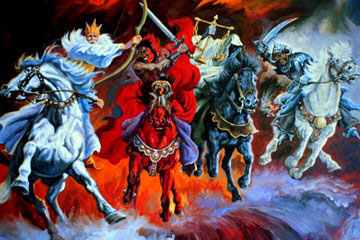 Perhaps this is why the means and ends of God’s wrath often
take's the form of wars and carnage. It must be kept in tension that the divine
wrath was not only visited upon the people of God but also on the gentile
nations. The bringing out of Egypt of God’s people and the resultant judgement
on Egypt
is a good example.
Perhaps this is why the means and ends of God’s wrath often
take's the form of wars and carnage. It must be kept in tension that the divine
wrath was not only visited upon the people of God but also on the gentile
nations. The bringing out of Egypt of God’s people and the resultant judgement
on Egypt
is a good example.
The incidences of God’s wrath are so numerous during this
period that only selected portions have been dealt with, so that when looking
at Paul’s writings about God’s wrath, a proper picture has been drawn as a
backdrop to his understanding.
The Post Exilic Period.
During the post-exilic period there is in some writings the
sense that God’s wrath can be appeased. Zechariah for instance writes about
God’s wrath having being appeased (Zech 6:8)
.
This however is not some reference to some human agent carrying out a specific
act that appeases God’s wrath but to the completion of his wrath via the
process of human history
.
The central theme of Zechariah is encouragement yet his writings centre the
wrath of God on the gentiles.
Hanson suggests that it was possibly the exile that caused Israel’s
deepest thinkers to stop, reflect, and meditate on the nature of sin, wrath,
and grace
.
Taking the position that Deutro-Isaiah was written during the post-exilic
period he points out that in Isaiah 57.16,17 and 60:10 that wrath and mercy are
juxtaposed. Mercy then he writes, “Checks and limits justice as revealed in
wrath”
.
This view however has a proviso, in that either God's wrath goes so far but it
is ultimately checked by his mercy, or that God’s love goes very far but that
ultimately he has to give way to wrath. A solution of which is contained in the
cross of Jesus.
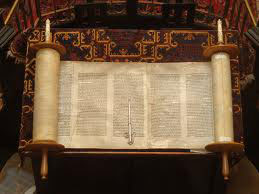 No matter which way this period of Israel’s history is viewed it cannot be escaped
that the destruction of Jerusalem and the razing
of the temple caused within Israel
a crisis of faith. It is obvious then that Israel had failed to listen to the
prophets sent by God. He had warned them of the coming exile. This then had the
effect of the destruction of the nation. The question they would have asked is
has God cancelled his covenant? It was this question as John Bright writes that
“put Israel’s
faith on trial for its life”
.
It was a crisis so severe that an adequate theological solution needed to be
found as there needed to be some hope for the future. This spark of hope had
already been provided years before by the prophets Jeremiah and Ezekiel by
their incessant announcing that the exile was Yahweh’s righteous judgement on
the nations sin. It was this that had caused the tragedy of the exile.
No matter which way this period of Israel’s history is viewed it cannot be escaped
that the destruction of Jerusalem and the razing
of the temple caused within Israel
a crisis of faith. It is obvious then that Israel had failed to listen to the
prophets sent by God. He had warned them of the coming exile. This then had the
effect of the destruction of the nation. The question they would have asked is
has God cancelled his covenant? It was this question as John Bright writes that
“put Israel’s
faith on trial for its life”
.
It was a crisis so severe that an adequate theological solution needed to be
found as there needed to be some hope for the future. This spark of hope had
already been provided years before by the prophets Jeremiah and Ezekiel by
their incessant announcing that the exile was Yahweh’s righteous judgement on
the nations sin. It was this that had caused the tragedy of the exile.
This allowed Israel
to see that God’s wrath was not some contradiction of their faith but rather as
Bright writes as, “vindication of Israel’s historic faith”
.
Thus, the exile could be seen as a deserved punishment and a purging of the
unfaithful ready for a new future as proclaimed by prophets like Jeremiah (Jer.
30&31). Increasingly during the post exilic period the peoples attention
turned to another concept already mentioned, that is "The Day of the
Lord".
In the beginning, this concept was bound to the idea that
God would, from time to time, through an act of salvation, achieve his
protection for the people
.
Prophets like Amos expressed the idea that on this day the wrath of God would
be turned against Israel
itself
.
This however was only an interlude in the history of the concept and the
post-exilic prophets returned to the idea of its being a day of salvation for Israel. Hoffman
considers the starting point for a definition of the term “Day of the Lord” to
be in Amos where he uses such terms as “the day of the whirlwind”, “the day I
shall visit the transgressions of Israel”, “the evil day”, “in that day”, and
“the day of the Lord”
.
These terms had by the post-exilic period become part of the single expression
“Day of the Lord”.
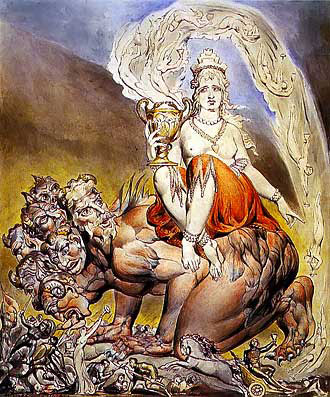 Graham Ogden in his commentary on Joel states, “The Day of
the Lord can be any moment in history in which Yahweh’s action is carried out”
.
Thus in Joel it is the time for judging the nations and for bringing blessing
and deliverance to Judah.
Paul Reditt points out in his article, “The Book of Joel and Peripheral
prophecy” that there are five eschatological themes amongst postexilic
prophecy; 1. The world kingdoms would be destroyed, 2. God would redeem and
free Israel as the sacred
community and assemble it in Jerusalem,
3. God would establish wonderful, paradisiacal living conditions for the Holy
community, 4. Yahweh and his Messiah would imminently assume rulership, 5. The
nations or the remnants would be converted
.
Graham Ogden in his commentary on Joel states, “The Day of
the Lord can be any moment in history in which Yahweh’s action is carried out”
.
Thus in Joel it is the time for judging the nations and for bringing blessing
and deliverance to Judah.
Paul Reditt points out in his article, “The Book of Joel and Peripheral
prophecy” that there are five eschatological themes amongst postexilic
prophecy; 1. The world kingdoms would be destroyed, 2. God would redeem and
free Israel as the sacred
community and assemble it in Jerusalem,
3. God would establish wonderful, paradisiacal living conditions for the Holy
community, 4. Yahweh and his Messiah would imminently assume rulership, 5. The
nations or the remnants would be converted
.
Mariottini writes that Joel “takes up the familiar concept
of the Day of Yahweh and reinterprets it to his contemporaries in terms of
universal judgement on the nations of the earth”
.
Verses like Joel 3:10 are interpreted to mean a summons for the coming day of
the Lord. The passage is dressed in apocalyptic imagery and revives the concept
of Holy War when Yahweh would vindicate his people. One could state then that
the post-exilic period sees a return to an earlier concept of the wrath of God.
This wrath then is something that will be primarily aimed at the nations who
oppress the people of God.
As with the exodus and God’s nurturing of Israel, we again see this in the book of Haggai
as the author introduces us to the generation of returnees involved in the
rebuilding of God’s house in Jerusalem.
Haggai’s mission seems to be twofold: 1. to call the people to complete the
temple and, 2. to give the people hope (2:6-9)
.
Verse 6 contains similar language to other “Day of Yahweh” verses in that it
refers to a time when “
heaven and earth will shake and tremble, the nations
also will shake such as to cause all their treasures to out and fill the temple
with splendor”.
It is obvious that the prophet is
not expecting a repetition of God’s wrath on Israel but rather a new sort of
glorious activity in the future
.
There appears to have been amongst the people who returned
from the exile an idea that the wrath of God had purged the nation and that the
Kingdom of God was about to be set up among a pure
remnant. The imagery of Zechariah 3:8
& 6:12 is that of the branch and how that branch would be the one who would
ultimately rebuild the temple and sit on the throne in glory. However, Joshua’s
experience is the foreshadowing of the Messianic branch (3:8)
.
As Joshua was not to be the one appointed, then this passage must have
eschatological significance and refer to the Messiah who is mentioned in other
apocalyptic literature
.
Like all the other postexilic prophets there is a hope held
for a future deliverer in Malachi 4:2-3,
someone who will come to prepare the hearts of the people, someone
who will fulfil the role and carry away with them the cause of God’s wrath.
New Testament Period.
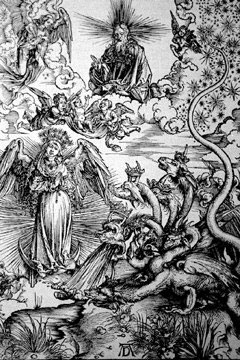 Tasker writes of this period, that history is unlike what Marcion
and many so-called Christians today claim that is that the Old Testament
portrays a God of wrath and the New Testament a God of Love
.
Tasker writes of this period, that history is unlike what Marcion
and many so-called Christians today claim that is that the Old Testament
portrays a God of wrath and the New Testament a God of Love
.
The incident in Acts 5:9
of the sudden death of Ananias and Sapphira by itself should be enough to
convince the hardest of sceptics that God’s wrath did not conclude with the
close of the Old Testament period. Both Testaments contain examples of the
consistency of the nature of God. God is indeed a God of goodness and a God of
wrath. Jesus himself made revelation about the wrath of God especially through
his parables. In contrast Jesus talks about the tragic event when the tower of Siloam fell on the people as not being
God’s wrath (Luke 13:3ff) (NRSV).
Unlike C.H.Dodd
who claims it as illegitimate to find the character of God exhibited in the
King of Matthew 22, it should be pointed out that as Tasker rightly concludes
the outcome of the parable Jesus makes it perfectly clear that God whose
character is always consistent will avenge his elect who cry out to him day and
night
.
In Mark's gospel, the emotions of
Jesus are drawn attention to not only as human emotions but also as divine
reactions to the word’s and deed of humans
.
Tasker draws our attention to how many commentators zero in on the fact that
the participle expressing the angry look of Christ in Mark 3:5 (peribeyaVmenoj)
is in the aorist tense, while the particle expressing the sorrow of Christ (sunlupoumenoj)
is in the present tense. The deduction then according to Tasker “would be that
his anger was expressed in a passing glance while his sorrow was persistent
”.
Thus we can conclude that Paul was faced not only with a written history of a
God of wrath but he would have also been aware of how Jesus had been consistent
in his teaching of God’s wrath aimed at those who failed to recognise the
absolute holiness of God and live in a relationship commensurate to that
holiness.
Paul’s View in his Writings.
The defining passage of Scripture that acts as a starting
point for most commentators when discussing Paul’s understanding of the wrath
of God is Romans 1:18.
John Murray writes that the gospel as the power of salvation is basically
useless without the impact of sin
including condemnation, misery and death. Paul spends from chapter one verses
eighteen to chapter three-verse twenty demonstrating that the whole world be
they Jew or Gentile is guilty before God and lies under his wrath and curse.
This raises the issue of C.H. Dodd and A.T. Hanson who not
being able to deal with the idea that a God of love could also be a God of
justice. Rather, like Marcion they relegate God’s wrath to “some process or
effect in the realm of objective facts”
.
 Dodd boldly makes the assertion that Paul never uses the
verb ‘to be angry’ with God as the subject. However, in Romans 1:18
gar
orgh\qeou
=places and
qeou
=
in the genitive
is used which denotes possession. Thus one might ask whose
orgh
, the
answer being God’s anger or wrath. Both Dodd and Hanson see wrath expressed in
Paul’s writings as an impersonal force. Dodd admitting that there lies tension
here which is not wholly resolved sees that the wrath and judgment as expressed
by the prophets and the psalmists as being focused on events actual or
expected, which are the inevitable results of sin. Claiming that when the
prophets speak of mercy they are thinking mainly of the personal relationship
between God and his people
.
Dodd boldly makes the assertion that Paul never uses the
verb ‘to be angry’ with God as the subject. However, in Romans 1:18
gar
orgh\qeou
=places and
qeou
=
in the genitive
is used which denotes possession. Thus one might ask whose
orgh
, the
answer being God’s anger or wrath. Both Dodd and Hanson see wrath expressed in
Paul’s writings as an impersonal force. Dodd admitting that there lies tension
here which is not wholly resolved sees that the wrath and judgment as expressed
by the prophets and the psalmists as being focused on events actual or
expected, which are the inevitable results of sin. Claiming that when the
prophets speak of mercy they are thinking mainly of the personal relationship
between God and his people
.
Wrath for
them is the effect of human sin but mercy is not the effect of human goodness
but is an inherent part of the character of God. While agreeing with Millard
Erickson when he writes, “God’s anger should not be thought of as
uncontrollable fury or personal spitefulness.... it is more in the nature of
righteous indignation”
, one cannot see the logic in Dodd
and Hanson’s view of an impersonal force.
Erickson
rightly
points out that in many cases
orgh\qeou
does
not only
refer to God’s present reaction to sin but also to certain divine actions to
come. In other words it is not only a present reality but is eschatological in
nature as well. Erickson goes onto indicate that passages such as Romans 1:18 teach that while the anger of God
presently rests upon sin and those who commit it, there will come a time when
this anger of God will be converted into action.
.
Erickson calls the dilemma of Dodd and Hanson “a point of
tension”
.
How do we look at the attributes of God who is a unified, integrated being and
deal with the issue of his justice as outlined here in Romans 1:18. On the one
hand, we see God’s justice, which to the human mind seems so cruel and harsh,
and on the other hand witness and experience the love of God which is so full
of mercy, forgiveness and is long suffering. Erickson asks the question “is
there then internal tension in God’s nature?”
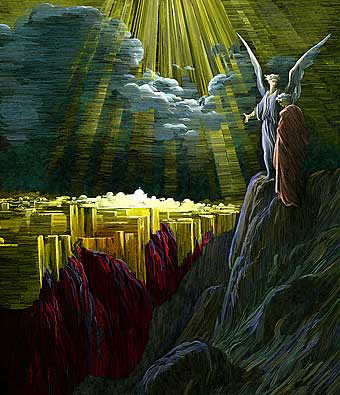 For John Stott the answer lies in the preceding verse, where
Paul writes about the righteousness of God. We have here a righteousness seen
in all its glory in the Cross of Christ
,
the ultimate demonstration of the justice of God. Throughout the pages of
Romans Paul goes to great lengths to protect and defend the righteous character
of God, because he believes that no matter whether God is acting in love,
mercy, in judgment or wrath he is absolutely consistent with his righteousness
.
In both Romans 2:5 and 3:5 Paul demonstrates his unswerving belief in the fact
that God is both just and merciful, displaying his wrath and his righteousness
together. He asks in 3:5 “is God unjust who inflicts wrath” and follows in
verse 6 with “certainly not! For then how will God judge the world?”
For John Stott the answer lies in the preceding verse, where
Paul writes about the righteousness of God. We have here a righteousness seen
in all its glory in the Cross of Christ
,
the ultimate demonstration of the justice of God. Throughout the pages of
Romans Paul goes to great lengths to protect and defend the righteous character
of God, because he believes that no matter whether God is acting in love,
mercy, in judgment or wrath he is absolutely consistent with his righteousness
.
In both Romans 2:5 and 3:5 Paul demonstrates his unswerving belief in the fact
that God is both just and merciful, displaying his wrath and his righteousness
together. He asks in 3:5 “is God unjust who inflicts wrath” and follows in
verse 6 with “certainly not! For then how will God judge the world?”
Hanson contrasts this by writing that for Paul the
impersonal nature of God’s wrath was important because it relieved him of
attributing wrath directly to God
.
For Hanson it transformed wrath from a personal attribute of God into a
process, which sinners bring upon themselves. Yet Murray writes, “to be subject to the wrath of
God is the epitome of human misery”.
God’s righteousness as the book of Romans expounds is the provision of God’s
grace to meet the exigency of his wrath.
Again, Stott points out the importance of making a tangible
connection between verses 16 and 17, which outline the gospel of God with
verses 18 through 32 where the essence of the wrath of God lives. Stott refers
to verses 16-20 as an argument of sustained logic, referring continually to the
power of God, the righteousness of God, the wrath of God and the glory of God
in creation
.
He speaks of a fourfold self-revelation of God, firstly God reveals his glory,
secondly he reveals his wrath against the sin of suppressing the knowledge of
the creator, thirdly he reveals his righteousness
in the gospel, and fourthly he reveals his power in believers by saving them.
At this point C.E.B. Cranfield in his commentary on Romans
writes of 1:17 that it holds the antithesis of 1:18 and that is God’s
righteousness. Paul he writes uses righteousness to convey the idea of
acquittal thus bearing up the idea that a merciful God can also be a God of
justice
.
For Cranfield the key to Paul understanding of God’s wrath lies in the phrase
“from faith to faith” (see Romans 1:17) for this is the only possible way for
humankind to have a status of righteousness before God
.
This helps bring into sharp focus the argument against that of Dodd and Hanson
that anger can only be an irrational passion. One would have to ask what
happens to righteous indignation or anger that is thoroughly rational.
Cranfield is correct in stating that Paul would not attribute to God an anger
that is not only capricious but also irrational rage
.
The question would then need to be asked, could God be a
good and loving God if he did not react to our evil with wrath. As a contrast,
Cranfield suggests that even the very highest and purest human wrath can only
be a faint reflection of God's wrath. Human wrath then is distorted and twisted
in comparison to the wrath of God
.
 At the heart of this is the cross as mentioned earlier. Leon
Morris writes of God’s great saving act, “that sin was a very real problem is
shown by the fact that God’s Son came to die as the means whereby it would be
put away”
.
Paul will expound this gospel, but will not give the remedy until he has
diagnosed the disease. It is important here that Paul establishes the need for
salvation by showing that all people are sinful and as such are subject to the
wrath of God
.
At the heart of this is the cross as mentioned earlier. Leon
Morris writes of God’s great saving act, “that sin was a very real problem is
shown by the fact that God’s Son came to die as the means whereby it would be
put away”
.
Paul will expound this gospel, but will not give the remedy until he has
diagnosed the disease. It is important here that Paul establishes the need for
salvation by showing that all people are sinful and as such are subject to the
wrath of God
.
Romans 5:9-10
further links the gospel, which Paul preaches, and the wrath of God. As Stott
writes of this passage he is clear in pointing out how for Paul we have been
saved from the guilt of our sins through Christ and the judgement due for them.
However, at the end of history there will be a day of reckoning. A reckoning
that will see God’s righteous judgement poured out on those who have rejected
him
. Those, whom having been already saved
will be exempt from this judgement; however they have not yet been delivered
from the sinful flesh in which they live.
Paul in Romans 5
indicates the costliness of the salvation to which we are apportioned. It is by
the very blood of Christ that we have attained this position. An enemy writes
Morris is not someone who comes up a little bit short of being a friend but
someone in an opposing camp or team
.
These sinners are the enemies of God as clearly stated several times in Paul’s
writings (Romans 11:28, Phil 3:18, Col 1:21, Eph 2:15-16). We are according to
Paul reconciled to Christ through his death.
It becomes obvious that Paul’s understanding of the wrath of
God is definitely influenced by his Pharisaic background and his understanding
of the Old Testament view of God’s wrath or the day of the Lord.
There remains however one question to be asked, why are both
Jew and Gentile subject to the wrath of God? As the latter prophets were
expectant of a day of wrath but one that would not so much judge Israel as the
world. The reason becomes obvious because they both failed to meet God’s
standard. Morris points out that the opposite of love is hate not wrath, while
wrath is a term that for us conjures emotion, yet for God there is no
emotiveness to his wrath, it is simply a refusal by the people to be in a right
relationship with him causing him to judge accordingly
.
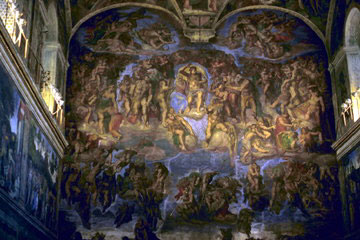 Looking at the Colossians passage 3:6 F.F. Bruce writes that
the vices of Romans 1:18
incur wrath
.
He goes onto point out that God has not only written his decree against them in
Israel’s
law but also in the conscience of humankind that none can claim impunity from
God’s retribution. Paul gives the church at Colossae instructions that are implicit in
there nature, ‘do not practice these vices’.
Looking at the Colossians passage 3:6 F.F. Bruce writes that
the vices of Romans 1:18
incur wrath
.
He goes onto point out that God has not only written his decree against them in
Israel’s
law but also in the conscience of humankind that none can claim impunity from
God’s retribution. Paul gives the church at Colossae instructions that are implicit in
there nature, ‘do not practice these vices’.
For L.J. Baggot, Paul in the section Colossians 3:1-17, “passes from negative
warnings to positive injunctions concerning the true Christian life and it’s
practice, as contrasted with false asceticism and visionary illusions of
theosophy”
.
There is he claims and rightly so, a stern realism in Paul’s theology which
never mistakes God’s love for sentimentality. This makes God’s wrath the
outpouring of his divine holiness in an attempt to restore humankind to his
moral principles
.
It is this last point that draws us to an article written by
William V. Crockett called, “Wrath that Endures forever”
.
Crockett’s thesis is that Paul was a particularist in the sense that, “in the
end all the wicked will be separated eternally from the righteous”
.
This question forces us to face the reality of God’s wrath and Paul’s
application of it. Those of the Universalist persuasion would say that in the
end the wicked would be given a chance to spend some time in a purgatory type
experience then because of God’s love be allowed to cross over so to speak into
the kingdom of God.
It has been argued by Dodd and Hanson that God’s love is
part of his true nature but wrath is not. For some this when extrapolated means
that God’s love endures forever and is endless and without limit thus allowing
for both the righteous and the wicked to be blessed with salvation on the day
of his eschatological judgement.
Paul in fact uses many words to denote God’s anger. He uses
such words as rejection, sternness, punishment and enemy.
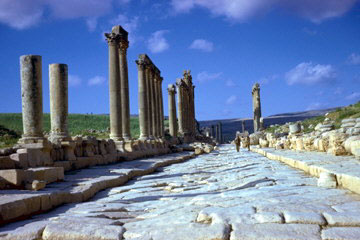 “orgh"
or wrath is as it has been seen throughout this piece of research, the
strongest form of God’s anger and in Paul’s usage it appears to be expressing,
“the utter hopelessness of the wicked in the face of an angry God”
.
So often when talking about God’s plan to save the world, Paul as in Romans
11:15 uses other words to refer to the ability of the
wicked to be reconciled to himself
.
Crockett’s thesis is that unlike wrath, Paul uses these other words in ways to
suggest that salvation lies within the reach of the wicked and unrepentant even
though God is angry at their behaviour. In Romans 11:22-23 he uses sternness
and in other passages like 1Cor 5:10, 2Cor 2:6, 2Thess 1:9 he uses other words
to denote God’s displeasure with the unrepentant.
“orgh"
or wrath is as it has been seen throughout this piece of research, the
strongest form of God’s anger and in Paul’s usage it appears to be expressing,
“the utter hopelessness of the wicked in the face of an angry God”
.
So often when talking about God’s plan to save the world, Paul as in Romans
11:15 uses other words to refer to the ability of the
wicked to be reconciled to himself
.
Crockett’s thesis is that unlike wrath, Paul uses these other words in ways to
suggest that salvation lies within the reach of the wicked and unrepentant even
though God is angry at their behaviour. In Romans 11:22-23 he uses sternness
and in other passages like 1Cor 5:10, 2Cor 2:6, 2Thess 1:9 he uses other words
to denote God’s displeasure with the unrepentant.
Wrath he claims is that while all these other terms allow
for hope, it does not
.
This author tends to agree that when Paul wishes to stress the fierce anger of
God and the complete and untenable position of the wicked he uses wrath and not
one of these other terms. It has been pointed out earlier by Stott’s words that
for Paul, God’s wrath is linked with the gospel of Christ who died that the
repentant may live. This event of one dying for the sins of many has a place in
Jewish history with the death of Uzzah in 2 Samuel 6. While it may have
appeared pointless for his death, it is clear as we uncover the roots of God’s
wrath that had the ark been transported in the correct manner and God’s
holiness given its place, as it was when the ark was finally moved to Jerusalem, Uzzah would
never have perished. He was one might say a forerunner of the type of sacrifice
it would take to make it possible for all to cleansed of their sinfulness.
Paul’s letters of which it would be impossible to
cover completely in a work this size use wrath in two ways; Firstly Paul talks
about wrath already present in this present age (e.g. Romans 1:18-32, Ephesians
4:17-19 and 1
Thessalonians 2:16). Secondly he writes of an eschatological
wrath that will fall on the unrepentant in the age to come (or in Old Testament
terms as has been shown earlier, the “Day of the Lord”). Such passages as Romans 2:5,8; 1 Thessalonians 1:10; 5:9, talk
about how in the age to come an out pouring of wrath will occur during a
complex set of events known to us as the “day of wrath”, commencing with the
parousia of 1 Thessalonians 1:10; 5:9.
Doctrinally the epistles to the church at Thessalonica are rich and there is
nowhere else that we can find so much source material for doctrines such as
eschatology, the ‘last things’
.
This becomes important when we consider whether since the time of Jesus, God
has been storing up his wrath for the last days.
 In Paul’s writings wrath is part of God’s love yet to say
that his eschatological wrath is not final is to minimise or discount both the
Cross and the gospel which Paul himself preaches. A wrath that is not final on
that day when all will be judged is no wrath at all. Most would agree that a
wrath that has a reformative element in the last days has an advantage as
Crockett calls it of seeming attractive or should one say more meaningful
,
or even hold some divine purpose. Many would in fact say that a God who
inflicts wrath or retribution on our loved ones, be they lost to the world or
not is not worthy as a God of love. This is exactly the same argument used by
Dodd and Hanson once more while trying to explain God’s wrath as some
impersonal force in a moral universe.
In Paul’s writings wrath is part of God’s love yet to say
that his eschatological wrath is not final is to minimise or discount both the
Cross and the gospel which Paul himself preaches. A wrath that is not final on
that day when all will be judged is no wrath at all. Most would agree that a
wrath that has a reformative element in the last days has an advantage as
Crockett calls it of seeming attractive or should one say more meaningful
,
or even hold some divine purpose. Many would in fact say that a God who
inflicts wrath or retribution on our loved ones, be they lost to the world or
not is not worthy as a God of love. This is exactly the same argument used by
Dodd and Hanson once more while trying to explain God’s wrath as some
impersonal force in a moral universe.
What must be admitted here is that God is, as Crockett
writes, not some “cosmic maniac gleefully extracting retribution from the
fallen part of creation for no purpose at all”
.
To be consistent with his nature, God must be above mindless
anger. In writing to the Thessalonians, Paul begins and ends his letter with
words of encouragement about the eternal hope believers have in Christ (1
Thessalonians 1:4-10; 4:13-5:11)
.
“Jesus, who rescues us from the wrath that is coming” (1Thess 1:10 NRSV) is
telling us what Matthew has already told us, that Jesus means Saviour
.
He has as Stott points out, already saved us from our sins and idols and we
must patiently wait for his coming again when he will complete the saving work
he started here on earth by rescuing us from the outpouring of the wrath of God
.
Again, Stott affirms that it is not some impersonal force, as Dodd and Hanson
believe, nor some vindictive outburst of temper but God’s righteous judgement
on those who fail to respect his holiness and repent.
Morris writes of this same passage that without any
argument, the universe is always God’s universe and subsequently nothing that
takes place in that universe can take place independently of God. Be that our
deliverance from sin or deliverance from the wrath to come
.
If we were to ignore this, we would be building a picture of a God who was
completely and personally indifferent to sin. The concept of the wrath of God
he writes “is a healthy corrective to such unmoral views of the Deity”
.
This whole concept stands for us today as an irrefutable fact that God is
totally against sin in all of its evil forms, be they the most trivial lie or
the most heinous crimes against humanity.
Returning to the challenge Crockett lays before us as to
whether there is any hope of escaping God’s eschatological wrath by some brief
existence in a purgative place then being restored to him we are forced to make
a decision. In the 1 Thessalonians passages, there is no hint of a reformative
element to God’s wrath. If as Paul writes throughout his letters that hell is a
place of eternal punishment then it seems appropriate to assume that once the
wicked are under eschatological wrath, God has indeed finished with them.
Crockett writes, “They are cut off from his love”
.
Statement of Paul’s View.
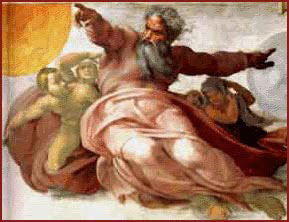 In trying to put Paul’s view of the wrath of God into a
short statement, it is important to recap the fact of his Pharisaic background,
which had him well grounded in Old Testament history and theology. Prior to the
exile, it was God’s own people whom where subject to his wrath but after the
exile, his wrath was more centred on the heathen and the unfaithful within the
community of Israel.
In trying to put Paul’s view of the wrath of God into a
short statement, it is important to recap the fact of his Pharisaic background,
which had him well grounded in Old Testament history and theology. Prior to the
exile, it was God’s own people whom where subject to his wrath but after the
exile, his wrath was more centred on the heathen and the unfaithful within the
community of Israel.
It is clear that Paul understands the wrath of God in a
manner similar to the post-exilic style. It is also clear that he expects God’s
wrath to fall only on the unbelievers at the close of the age. Yet, as Crockett
points out “judgement begins at the house of God and believers who sin may sometimes endure trials in their earthly life”
,
1 Corinthians 5:5; 11:27-32, are examples of this.
Hence, it is clear that for Paul, God’s wrath has both a
here and now element as well as a not yet element. It is present here today
with Jesus as the judge but also the giver of grace. For Paul, God’s wrath in
this present age is tied to the gospel and is expressed in the sinfulness of
the world. This transitory manifestation points ahead to a full and final
eschatological wrath at which time the Old Testaments “day of the Lord” will be
exercised and the wicked judged and sent to an eternal separation from all that
is good and holy.
These two aspects of God’s wrath are evident throughout
Paul’s writings and hold in tension the God who is slow to anger and the God
who cannot see sin and the wicked unpunished. There is a sense in Paul’s
writings especially evident in Romans 1:18
that God’s wrath is being delayed.
Deliverance from God’s wrath lies in Jesus as the one who
brings the sinful into the presence of God as clean and unblemished after the
acceptance of his once for all sacrifice on the cross. This is the gospel that
Paul preaches and the guiding hand that leads him as he writes of the wrath of
God.
Application.
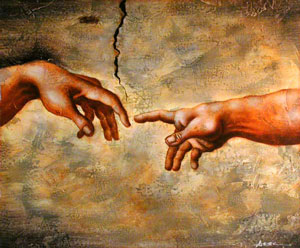 There are so many issues that one could try to apply the
concept of God’s wrath to in today’s world that it beggars belief. Famines,
earthquakes and floods are to be viewed every day on the world news yet no
issue has split the Christian Church apart like the issue of AIDS.
There are so many issues that one could try to apply the
concept of God’s wrath to in today’s world that it beggars belief. Famines,
earthquakes and floods are to be viewed every day on the world news yet no
issue has split the Christian Church apart like the issue of AIDS.
Is AIDS God’s punishment on the homosexual community? David
J. Baggett outlines the three main views on this discussion as being: 1) YES,
2) A qualified yes and 3) NO
.
As we try to comprehend this subject in light of Paul’s own
understanding just outlined, how then do we apply it to this issue.
Baggett points out for the proponents of the YES option it all comes down to,
“If you do it, you die”
.
Such passages as Romans 1:27 may be sighted but what this option really
requires is a miracle from God as Gordon Kaufmann’s definition implies, “any
event which one finds himself led to interpret by reference to God’s act rather
than finite acts and causes (though not necessarily denying that such finite agency
is also involved) is a miracle
.
Those who hold to the second option tend to endorse the idea
that AIDS is a natural consequence and albeit the cost of sin. They would
equate dying from AIDS with dying from heart disease from a lifetime of poor
eating habits. Support then may be found in Paul’s emphasis on the natural
order and homosexuality as a transgression of that order. Then one has
consequences that are detrimental to the holistic life that God intended us to
live.
The third or NO option claims that AIDS is more to do with a
virus introduced in people. As Baggett writes this does not make such people
“ethically or doctrinally bankrupt”
.
These same people may well emphatically affirm the traditional biblical concept
of homosexuality as being bereft of God’s laws. Their main problem begins and
ends with any inference that a God of love would deliberately afflict such a
disease upon anybody.
 The first or YES option has to contend with the fact that
not all people who engage in homosexual relations contract the AIDS virus and
that by taking precautions, such as the use of condoms the disease can be
limited in its transmission. Have these people found some way other than Paul’s
way of the cross to escape the wrath of God? What about the innocent who
contract the virus without ever having engaged in such sexual relations, has
God accidentally zapped the wrong people?
The first or YES option has to contend with the fact that
not all people who engage in homosexual relations contract the AIDS virus and
that by taking precautions, such as the use of condoms the disease can be
limited in its transmission. Have these people found some way other than Paul’s
way of the cross to escape the wrath of God? What about the innocent who
contract the virus without ever having engaged in such sexual relations, has
God accidentally zapped the wrong people?
Baggett is right in claiming that this position runs very
close to the old Calvinistic idea of Double Predestination
.
People who hold to this YES option are often blinded by their own prejudice
towards sexual sin and one must ask what kind of God do they serve? Certainly
not the God of Paul’s writing’s whose intent it is for none to perish for the
gospel of the Cross has paid abundantly for all humankind’s sin. Or one may ask
was Christ’s life not a worthy sacrifice for all?
“What about the homosexual that contracts AIDS and is
converted to Christ”, asks Baggett? Has not the blood of Christ cleansed them
of all their sins? This author agrees with Baggett that this option in
untenable.
The second option Baggett sees as having one potential
weakness
,
causality. He sees that those who adhere to this option have a God who is with
good intent punishing homosexuals in their sinfulness with a disease. This
causal tie is broken again by the fact that the use of condoms can avoid the
disease.
This option also falls down Baggett writes, “Because AIDS is
not part of the natural order”
.
Scripture portrays a God who is against disease and sickness, with even David
describing God as the one who forgives all our sins and heals all our diseases.
Jesus himself came that we might have life and that more abundantly. Thus, it
is the enemy who comes to steal, kill and destroy.
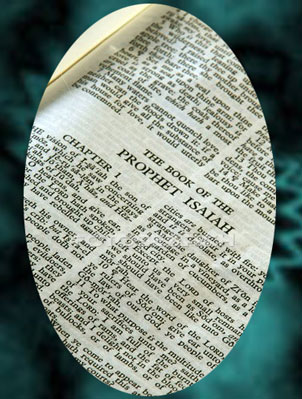 It is the third or NO option that Baggett picks up and
expands into a fourth option. A qualified no, because it cannot be said
understanding Paul’s view of the wrath of God that God has nothing at all to do
with AIDS and it’s spread. Those holding to the NO option rightly stress the
truth of God’s nature being one of Holiness and Righteousness but do so without
a proper understanding of his Holiness. Baggett’s qualified no, holds what this
author believes is the closest outcome after studying Paul’s concept of the
wrath of God. This view states that God did not intentionally or maliciously
introduce a virus of death into our society by direct intervention. Rather he
allowed it although it was not part of his original created order. If God’s
wishes had been carried out and his holiness was held in the correct place by every
living thing then this virus would never have occurred
.
God’s original intent that we not suffer is found throughout the Pauline
writings, 1 Corinthians 12:9, 1 Corinthians 12:28, 2 Corinthians 2:15 and many
other passages where Paul uses the Greek word “
swzw
” which holds not only the
meaning of salvation from our sins but also the sense of holistic healing
.
It is the third or NO option that Baggett picks up and
expands into a fourth option. A qualified no, because it cannot be said
understanding Paul’s view of the wrath of God that God has nothing at all to do
with AIDS and it’s spread. Those holding to the NO option rightly stress the
truth of God’s nature being one of Holiness and Righteousness but do so without
a proper understanding of his Holiness. Baggett’s qualified no, holds what this
author believes is the closest outcome after studying Paul’s concept of the
wrath of God. This view states that God did not intentionally or maliciously
introduce a virus of death into our society by direct intervention. Rather he
allowed it although it was not part of his original created order. If God’s
wishes had been carried out and his holiness was held in the correct place by every
living thing then this virus would never have occurred
.
God’s original intent that we not suffer is found throughout the Pauline
writings, 1 Corinthians 12:9, 1 Corinthians 12:28, 2 Corinthians 2:15 and many
other passages where Paul uses the Greek word “
swzw
” which holds not only the
meaning of salvation from our sins but also the sense of holistic healing
.
So are homosexuals worthy of death asks Baggett? “Yes.
Just as are the malicious and unmerciful”
.
In Jesus day it was the lepers who where the outcasts who must have committed
some sin worthy of their punishment but Jesus inverted that by reaching out and
touching and healing them
.
Conclusion.
Looking back on Paul’s writings and the influences that can
be seen coming through from his strict upbringing and teaching from the Old
Testament it can be seen that God’s wrath as we have seen has both here and now
and not yet elements, both of which help the qualified no option of Baggett in
the AIDS debate hold credence. It is this qualified no option that allows the
mystery that continues to plague theologians and philosophers, that is the
issue of why does God who has the power the alleviate suffering in the world
fail to do so. This is perhaps the greatest challenge to faith. This author
would like to conclude with the words of Baggett, “Most attempts to claim that
AIDS is God’s punishment of homosexuals are a convenient way out for those who
do not seriously struggle with the profundity and unmitigated horror of such a
disease”. They refuse to acknowledge God as the one who suffers with us most,
as the One who sent his Son to die on the cross in our place”
. One has to ask then is this not what
Paul is all about.
BIBLIOGRAPHY
Allen, Ronald B., The Expositors
Bible Commentary. 12 Volumes “Numbers” (Ed. Frank E. Gæbelein: Grand Rapids; Zondervan,
1990) Volume 2.
Anderson, A.A., 2 Samuel. (Dallas;
Word Publishers, 1989).
Ashley, Timothy R., Numbers. New
International Commentary of the Old Testament.(Grand
Rapids; Eerdmans, 1993).
Baggett, David J., “Aids and the Wrath of God”The
Asbury Theological Journal Vol 49 No 1 (79-86) Spring
1994.
Baggot, L.J., New Approach to Colossians.(Oxford; A.R. Mowbray & Co. Limited, 1961).
Bright, John., History of Israel (London: SCM Press, 1981).
Bromiley, Geoffrey W., Theological
Dictionary of the New Testament. Abridged in One Volume.
(Ed Gerhard Kittel & Gerhard Friedrich; Grand Rapids:
Eerdmans, 1985).
Bruce, F.F., The Epistle
to the Colossians. “The New International Commentary on The New Testament” (Grand Rapids; Eerdmans, 1984).
Cranfield, C.E.B., The
Epistle to the Romans. Volume 1 (Edinburgh; T&T
Clark, 1975).
Crockett, William V., “Wrath That Endures
Forever” Journal of the Evangelical Theological Society.
Volume 34 No 2 195-202 June 1991.
Dodd, C.H., The Epistle to the
Romans (London; Fontana Books, 1959).
Erickson, Millard J., Christian Theology. (Grand Rapids; Baker Book House, 1985).
Gesenius, H.W.F., Gesenius’
Hebrew~Chaldee Lexicon to the Old Testament. (Grand Rapids; Baker Book House, 1979).
Hanson, Anthony Tyrrell., The
Wrath of the Lamb. (London; SPCK, 1957).
Harris, R. Laird., The Expositors
Bible Commentary. “Leviticus” (Ed. Frank E. Gæbelein: Grand Rapids; Zondervan,
1990) Volume 2.
Hendrickson, William., 1&2
Thessalonians. (London; Banner of Truth, 1955).
Hoffmann, Yair., “The Day of the
Lord as a Term in the Prophetic Literature”, Zeitschrift
fur die Alttestamentliche Wissenscraft, Vol 93 No
1, 37-50 (1981).
Kaiser, Walter C., The Expositors
Bible Commentary. 12 Volumes “Exodus” (Ed. Frank E. Gæbelein: Grand Rapids; Zondervan,
1990) Volume 2.
Kline, Meredith G., “The Structure of the
Book of Zechariah”, Journal of the Evangelical Theological Society, Vol
34 No 2 179-193 (1991) June.
La Sor, William Sanford., et al.,
Old Testament Survey. (Grand Rapids; Eerdmans, 1982).
Maroittini, Claude F., “Beat Your
Ploughshares into Swords”, Perspectives in Religious Studies, Vol 14
125-130 (1987).
Morris, Leon., The Epistle to
the Romans. (Grand Rapids: Eerdmans, 1988).
Morris, Leon., 1 and 2
Thessalonians. “Tyndale New Testament Commentaries” (Grand Rapids; Eerdmans , 1984).
Murray, John., The Epistle to
the Romans. “New International Commentary of the
New Testament” (Grand Rapids: Eerdmans, 1993).
Ogden, Graham S., & Deutsch, Richard
R., Joel and Malachi. (Grand Rapids; Eerdmans,
1987).
Patterson, R. D., & Austel,
Hermann J., The Expositors Bible Commentary. 12 Volumes “1&2 Kings” (Ed. Frank E. Gæbelein: Grand Rapids; Zondervan,
1990) Vol 4.
Peterson, David L., Old
Testament Library, “Haggai and Zechariah
1-8”, (London; SCM Press, 1985).
Reditt, Paul L., “The Book of Joel and
Peripheral Prophecy”, Catholic Biblical Quarterly, Vol 48 No 2 225-240
(1986).
Stevenson,
J., Ed, A New Eusebius. (London, SPCK, 1997).
Stott, John R.W., The
Message of Romans. (London: Intervarsity Press, 1994).
Stott, John R.W., The
Message of Thessalonians. “The Bible Speaks Today”
(Leicester; Inter-varsity Press, 1991).
Tasker, R.V.G., The
Biblical Doctrine of the Wrath of God. (London; Tyndale,
1957).
Tertullian, Ante-Nicene Fathers - Vol.
03 (Albany; Sage Digital Library, 1996).
von Rad, G. “The Origin of the
Concept of the Day of Yahweh” The Journal of Sematic Studies. Volume IV 1959
97-108.
Wenham, Gordon J., Leviticus.
New International Commentary of the Old Testament. (Grand Rapids; Eerdmans, 1979).
White, W. Jr., The
Zondervan Pictorial Encyclopedia of the Bible.
“Wrath” 5 Volumes (Ed Merrill C. Tenney;
Grand Rapids; Zondervan, 1976) Vol 5.
Youngblood, Ronald F., The
Expositors Bible Commentary. 12 Volumes “1&2 Samuel”
(Ed. Frank E. Gæbelein: Grand
Rapids; Zondervan, 1990) Vol 3.